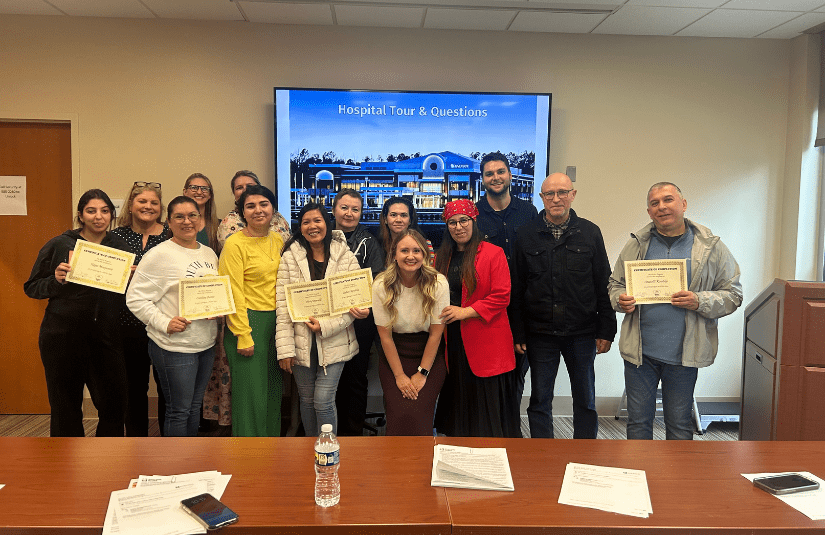Building Confidence Through Connection: Williamsburg Hospital Partners with Literacy for Life to Empower ESL Patients
To help patients from diverse backgrounds feel more confident about navigating a hospital setting, Riverside Doctors’ Hospital Williamsburg (RDHW) recently hosted a field trip for students from the local nonprofit Literacy for Life (LFL).
Twelve adults enrolled in LFL’s HEAL Program, an eight-week health literacy class, spent 1½ hours at RDHW on Nov. 11. All were English as a Second Language (ESL) learners, although HEAL also is open to native English speakers.
To start, RDHW leaders gave a presentation that covered practical information such as common medical terms and hospital signage, required paperwork such as admission and consent forms, patient rights, and available interpretive services for ESL patients.
Small groups then toured the lobby, Emergency Department, Medical/Surgical and Surgical Services areas. At each stop, guides encouraged patients to advocate for themselves and ask questions if they ever felt confused or overwhelmed.
“We never rushed, because we wanted everything to be understandable,” said Kelly Wendley, Quality Director at RDHW and one of the event organizers. “We don’t ever want people to feel anxious or even afraid about going to a hospital or calling 9-1-1.”
Wendley partnered with Ali Potts, RDHW’s Patient Relations and Volunteer Program Manager, and Dana Gibler, the hospital’s Quality and Accreditation Manager, to develop the curriculum. The team also included a stroke education segment on prevention, symptom recognition and the importance of seeking immediate medical attention.
The program was so successful that Fiona Van Gheem, LFL’s Assistant Director, has already scheduled another field trip for March 4. RDHW and LFL hope to continue the visits on a regular basis after that, perhaps quarterly.
“People absolutely left feeling more comfortable,” Wendley said. “You could see it on their faces and in how engaged they were by the program’s end. Williamsburg is a wonderful melting pot, so it’s very fulfilling to take a step that’s fairly simple but quite meaningful.”
The HEAL Program teaches skills such as how to make healthier lifestyle choices, effectively describe symptoms to doctors, ask necessary questions about follow-up care and prescriptions, read medical instructions, understand Advanced Medical Directives and other legal documents, and choose between urgent care centers and emergency rooms.
Goals include improving patient outcomes, safety and satisfaction during treatment for physical and mental health concerns; reducing hospital admissions, readmissions and costs; and easing the burden on often-overcrowded emergency rooms.
